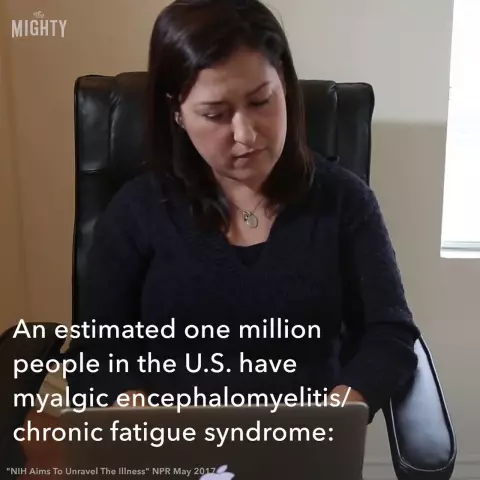- Author Rachel Wainwright [email protected].
- Public 2023-12-15 07:39.
- Last modified 2025-11-02 20:14.
Chronic fatigue syndrome - a disease of the 21st century
In large cities, it is not uncommon for people to suffer from what is today known as chronic fatigue syndrome (CFS). This ailment affects people belonging to various socio-demographic groups and living on all continents.

Source: depositphotos.com
Most of all, CFS are affected by women aged 25 to 45 years. According to statistics, the number of cases of the disease varies in different countries from 10 to 37 people per 100,000, but experts believe that these figures are significantly underestimated, since people suffering from CFS do not always consider it necessary to seek help. The disease is quite difficult to determine and it is far from always possible to completely cure.
Signs and causes of chronic fatigue syndrome
Persistent fatigue, which does not disappear even with extended rest, was first diagnosed as a separate disease in 1984. Physician Paul Cheney, who practiced in the state of Nevada (USA), observed a complex of similar symptoms in almost 200 residents of a small village, in which not long before that there was an epidemic of an infectious disease caused by a pathogen similar to the herpes virus. All patients complained about the following:
- rapid fatigability, feeling tired even after sleep;
- muscle weakness, decreased performance;
- weakening of attention, inability to concentrate;
- progressive headaches for no apparent reason;
- joint pain (no swelling) and spine;
- sleep disorders, expressed in insomnia at night and drowsiness during the day;
- loss of appetite;
- dry mucous eyes and mouth, sore throat;
- soreness of the lymph nodes;
- drops in blood pressure;
- unstable emotional state, alternating periods of apathy and aggressiveness;
- anxiety, depression.
Today, a person who has at least six of the listed symptoms may be recognized as suffering from chronic fatigue syndrome. At the very beginning of the disease, neither the instrumental diagnostics nor the test results reveal any pathology in the body. As the disease develops, blood tests determine deviations in the content of leukocytes, an increase in the number of antibodies, as well as signs of malfunctioning of the liver and other internal organs. If you do not start treatment, the patient runs the risk of serious health problems.
The origin of chronic fatigue syndrome has not been clarified. Some scientists believe that the appearance of the syndrome is provoked by pathogens (herpes viruses type 6 and hepatitis C, enterovirus, cytomegalovirus, retrovirus, etc.). The existence of a specific pathogen, which has not yet been detected, is not excluded. There is a certain basis for this theory: the onset of CFS often coincides with an acute flu-like infection. Such factors play an equally important role in the development of the disease:
- poor environmental situation. Indeed, CFS mainly affects residents of megacities;
- improper nutrition;
- violation of sleep and wakefulness;
- activities associated with huge psychological stress against the background of low physical activity;
- decreased immune status, tendency to colds and allergic reactions;
- stress in family life and at work.
Most of the methods of treatment for chronic fatigue syndrome used today are in one way or another associated with attempts to optimize the patient's regimen, to help him endure life in the "stone jungle" more easily.
Specificity of CFS treatment
The difficulty of diagnosing and treating CFS is associated not only with the need to distinguish its manifestations from the symptoms of many other ailments, but also with the fact that the sick, as a rule, are in no hurry to see a doctor.

Source: depositphotos.com
Chronic fatigue syndrome is called the disease of workaholics. The main risk group is residents of megalopolises engaged in responsible work related to stress (entrepreneurs, managers, managers of banks and companies, airline dispatchers, etc.), that is, people who are constantly on stress, sleep little, eat irregularly and even at home cannot be distracted from thinking about work. In such a situation, it is almost impossible to stop, to stop the daily race, all the more to admit that he is sick.
CFS therapy includes a set of measures designed to make the life of patients in general healthier and more peaceful. Usually, the doctor recommends optimizing the work and rest regimen, eating on time, giving preference to healthy food, spending a lot of time outdoors, doing sports (with moderate exertion). Hydrotherapy procedures, massage and physiotherapy exercises are of great benefit. Patients suffering from instability of the emotional state are shown sessions of psychotherapy and auto-training, less often - drugs (tranquilizers, antidepressants, etc.). The response of CFS patients to treatment is very individual. Some are helped by techniques such as oxygen therapy or acupuncture. Recently, laser treatment has been successfully used (the method proved to be effective in relation to more than 86% of patients).
If you notice symptoms of the disease, you should immediately contact a therapist for qualified help. In advanced cases, the condition of people suffering from chronic fatigue cannot be significantly improved, despite the best efforts of doctors. For such patients, the usual way of life can result in complete disability.
YouTube video related to the article:

Maria Kulkes Medical journalist About the author
Education: First Moscow State Medical University named after I. M. Sechenov, specialty "General Medicine".
Found a mistake in the text? Select it and press Ctrl + Enter.






